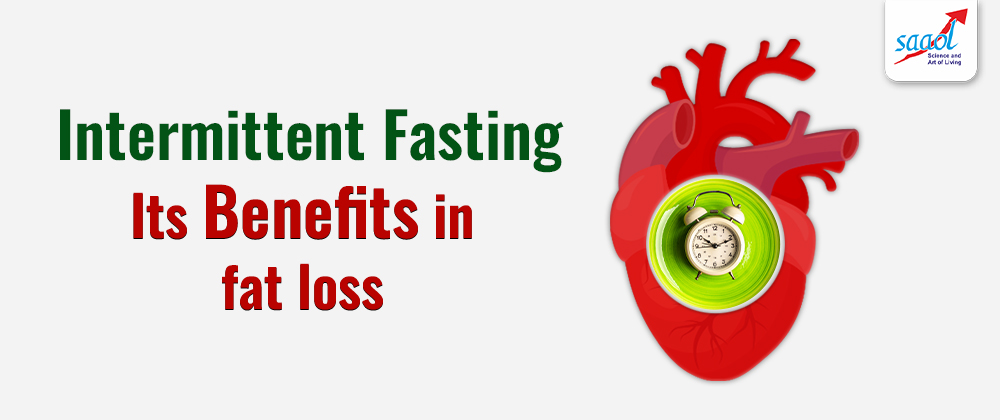Intermittent Fasting: Its Benefits in Fat Loss
SAAOL
- March 2, 2023
- 6 Min Read

Before practicing intermittent fasting or talking about its benefits, you need to first understand what intermittent fasting means. This blog will help you get a brief idea of intermittent fasting benefits and tell you an ideal intermittent fasting diet plan for fat loss in India and most importantly, its actual meaning.
Continue reading this blog to learn about it!
First, Understand What Intermittent Fasting Exactly is
In intermittent fasting, frequent fasting intervals are replaced with non-fasting intervals, which is a type of dietary habit. Roughly, you can either do a 16-hour continuous fast or split it into two 8-hour portions. You can eat from midday until 8 at night and then stop eating until noon the following day. Before beginning their 8-hour eating schedule, some people find it helpful to eat a light dinner or even a snack. Some people find it challenging to do a fast for 16 hours, so they divide it into three 4-hour segments. Keep in mind that this is just the schedule and not the actual intermittent fasting diet plan.
The list of intermittent fasting benefits is very long but the most important of them are, it promotes weight loss, increases insulin sensitivity, lowers the chance of developing chronic diseases, and is frequently used to become more healthy. There is an ideal intermittent fasting diet plan for fat loss in India which may be different for different individuals and will be discussed later in this blog.
Remember, Intermittent Fasting Says That One Size Doesn’t Fit All!
Therefore, it is necessary to keep in mind that the safety and suitability of intermittent fasting may differ depending on an individual’s gender, age, general health, and other considerations. If you want to try intermittent fasting, it’s important to consult a healthcare professional or a trained dietitian to find out if it’s right for you and to get advice on how to do it safely.
The 10 Benefits of Practicing Intermittent Fasting
Here are the top 10 benefits that your body will experience after following intermittent fasting and will also make you put a step towards making an intermittent fasting diet plan for fat loss in India. Intermittent fasting benefits:
- Weight reduction: By lowering your calorie intake and raising your calorie expenditure, intermittent fasting may aid in weight loss.
- Improved insulin sensitivity: Intermittent fasting may increase insulin sensitivity, which can help lower blood sugar levels and minimize the risk of type 2 diabetes.
- Increased lifespan: According to some studies, intermittent fasting may extend life by lowering oxidative stress and inflammation in the body.
- Helps to stimulate the process of autophagy: Autophagy is the body’s method of removing damaged cells and regenerating new ones. This procedure is thought to be essential for preserving general health and halting the progression of chronic illnesses like Alzheimer’s.
- Lowers BP: Intermittent fasting has been demonstrated to reduce blood pressure in certain persons.
- A better ability to repair cells: Intermittent fasting may encourage the generation of human growth hormone, which is important for cellular repair.
- Improved blood and sugar control: Intermittent fasting has been demonstrated to enhance blood sugar regulation in persons with prediabetes or type 2 diabetes.
- Reduced inflammation: Intermittent fasting has been demonstrated to diminish inflammation in the body, which may help reduce the chance of developing chronic diseases including cancer and heart disease.
- Improvement of brain function: Intermittent fasting may enhance brain function by raising levels of brain-derived neurotrophic factor (BDNF), a protein that supports the growth and survival of brain cells.
- Reduced risk of heart disease: According to certain studies, lowering inflammatory indicators and raising cholesterol levels with intermittent fasting may help lessen the risk of heart disease.
An Ideal Intermittent Fasting Diet Plan for Fat Loss
There is no one “perfect” diet for intermittent fasting because the best diet for you will depend on your personal needs and tastes. Everyone is different, and what works for one person may not work for another. Intermittent fasting diet plan varies from person to person. However, there are a few points to keep in mind while practicing intermittent fasting in your dietary routine:
- First, choose an intermittent fasting schedule that works best for you.
- During intermittent fasting, stay hydrated by drinking plenty of water and other calorie-free liquids to help you feel full.
- If you find it difficult to get all the nutrients you need during mealtimes, you can supplement your diet with a high-quality multivitamin or other foods.
- Despite the temptation to “make up” for the calories you missed out on during your fast by overindulging during your non-fasting hours, it’s important to try to control your maintain portion and avoid overdoing it.
- Take your time and eat slowly. You can feel more fulfilled after meals if you can learn to tune in to your body’s hunger and fullness signals.
- During the non-fasting periods, stay away from processed and high-sugar foods. Blood sugar surges and crashes brought on by these foods can make it challenging to maintain a fasting diet.
- The majority of your nutrition should come from whole, unprocessed meals like fruits, vegetables, whole grains, lean meats, and wholesome fats found in avocados and almonds, so focus on choosing them. In comparison to processed and refined diets, these foods are typically more filling and high in important nutrients.
Who Should Not Follow the Intermittent Fasting Diet Plan
Keep in mind that even if a person knows intermittent fasting benefits, it is not a one-size-fits-all strategy and might not be appropriate for everyone.
Before beginning any new intermittent fasting diet plan, someone who is pregnant, lactating, underweight, or has a history of disordered eating should consult a healthcare professional.
Conclusion:
It’s important to start gently and pay attention to your body if you want to start intermittent fasting. Keeping track of your food intake might help you ensure you get all the nutrients you require. To reduce the feeling of hunger, taking in extra protein and healthy fats while eating foods is beneficial for some people. Make an intermittent fasting diet plan for fat loss in India, which will be different for each individual.
Generally, intermittent fasting is a favorable approach to improving health and losing weight. And now you know the other intermittent fasting benefits too! So to receive personalized guidance on how to implement intermittent fasting into your diet safely and effectively, you can speak with a healthcare provider or a qualified dietitian.
